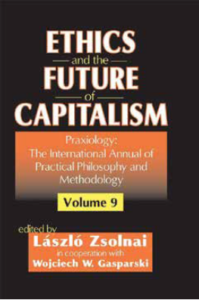In 2002, the book entitled “Ethics and the Future of Capitalism” was published by Transaction Publishers in New Brunswick and London. Laszlo Zsolnai edited the book in cooperation with Wojciech W. Gasparski. This volume addresses the ethical problems of the capitalist economy with special reference to globalization.

In Chapter 1, George Soros’s criticism of “market fundamentalism” is introduced. Andras Brody (Hungarian Academy of Sciences), Olivier Giscard d’Estaing (INSEAD), Ferenc Rabar (Corvinus University of Budapest), and Jorn Rusen (University of Witten/Herdecke) discuss and further develop Soros’s main argument that laissez-faire capitalism undermines the very values on which open and democratic societies depend. The instabilities and inequalities of the capitalist system tend to feed into nationalistic, ethnic and religious fundamentalism. We should prevent a return to
that kind of fundamentalism by correcting the excesses of market fundamentalism beforehand.
In Chapter 2, Peter Koslowski (Hannover Institute of Philosophy) stresses that a capitalist economy can show individuals the relative prices and the optimal allocation of resources but cannot relieve them of making the choice between goals and values. For this reason there is a need for reembedding business, the market, and economic motivation into the framework of ethical and social norms. Capitalism should be reembedded in the ethics and culture of a society.
In Chapter 3, Lubomir Mlcoch (Charles University, Prague) focuses on the problematic of Czech-style capitalism. He argues that introducing laissez-faire capitalism without respecting the cultural norms and institutional settings of a society necessarily leads to great inefficiency and enormous social losses.
In Chapter 4, Stefano Zamagni (University of Bologna) investigates the role of civil society in relation to the market and the state. He shows that civil society is based on reciprocity, a quality that is vital in the functioning of advanced market economies. Reciprocity ties may modify the outcome of the economic game either by stabilizing the cooperative behavior of agents or by endogenously altering the preferences of the agents themselves. Civil society can contribute significantly to the development of capitalism.
In Chapter 5, Edward R. Freeman’s (University of Virginia) ideas about stakeholder capitalism are introduced. He argues that the stakeholder relationship is a key to understanding the functioning of business in today’s world. Stakeholder capitalism allows for the possibility that business can be a fully human institution that urges managers to create value for all stakeholders.
In Chapter 6, Wojciech W. Gasparski (Polish Academy of Sciences) introduces the praxiology tradition in the debate about ethical aspects of capitalism. He proposes a “triple E” paradigm for judging economic actions; namely, effectiveness, efficiency, and ethics. A well-functioning economy should satisfy all these criteria simultaneously. Some religious perspective is provided to defend the “triple E” model.
In Chapter 7 of the book, Laszlo Zsolnai (Corvinus University of Budapest) explores the conditions of the ethical and social acceptability of profit making. He argues that profit is ethically acceptable if it is produced by activities that in aggregate do not violate the existing ethical norms. Profit is socially acceptable if it is produced by activities that in aggregate do not cause harm to the stakeholders. Hence, non-violence emerges as a necessary condition of acceptable business practices.